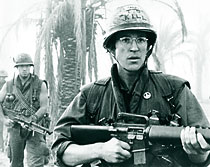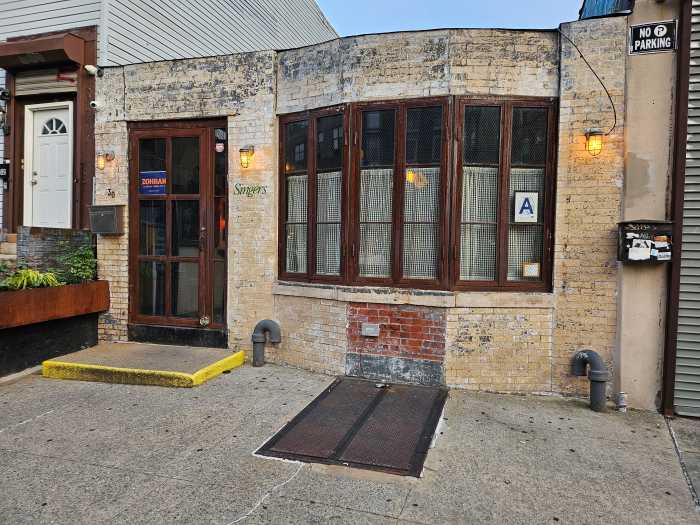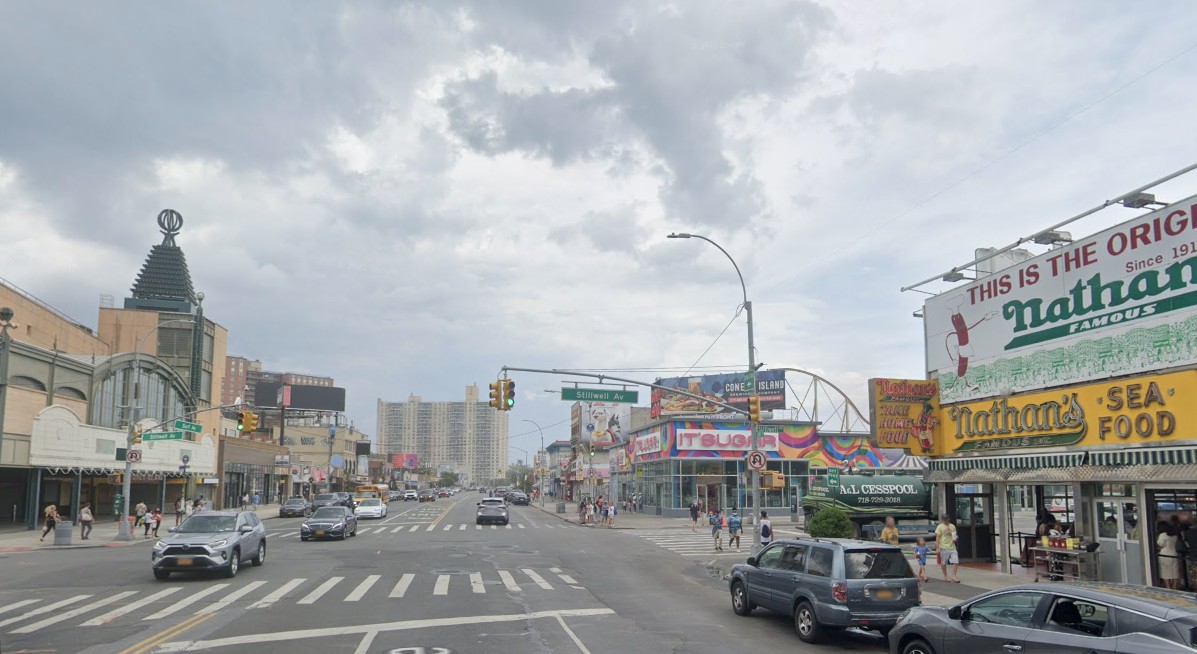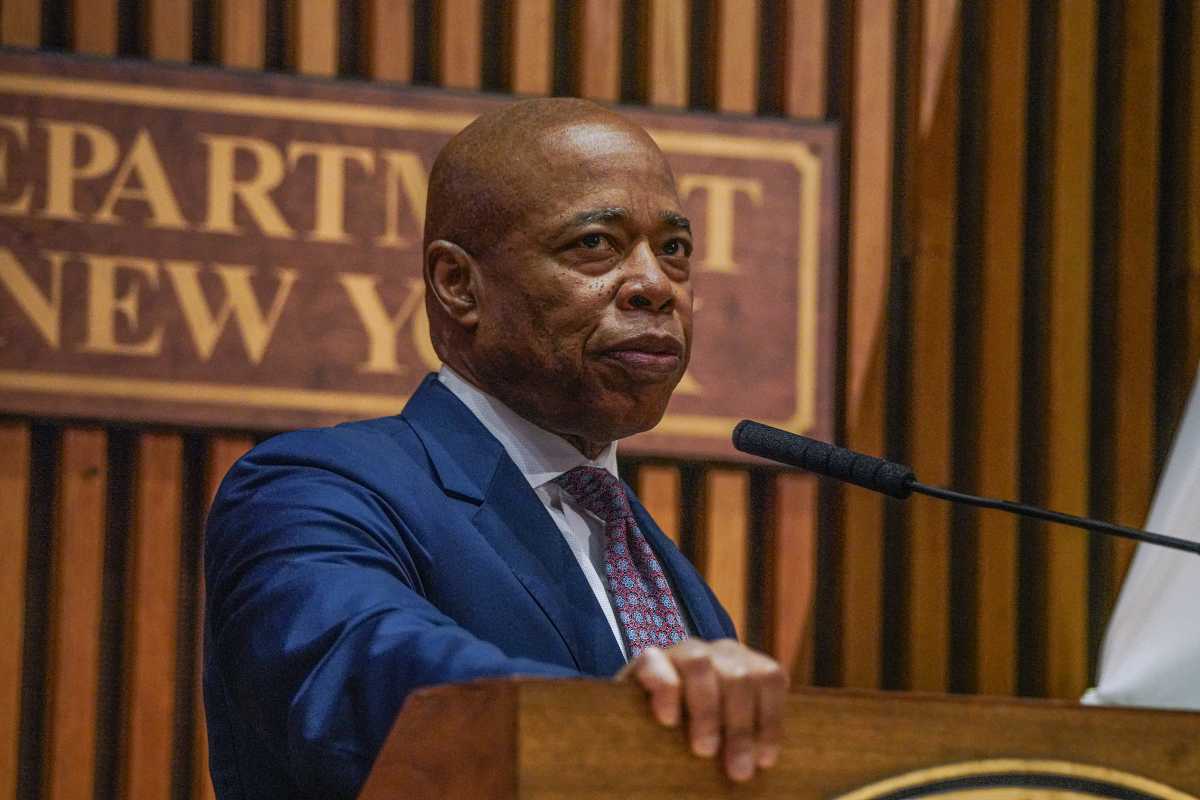Matthew Modine was a 24-year-old actor
when cast as Private Joker in Stanley Kubrick’s 1987 Vietnam
epic "Full Metal Jacket."
Now, 20 years after filming, Modine returns to the years he spent
with Kubrick and his fellow actors in England in his new book,
"Full Metal Jacket Diary."
And on Nov. 1, he’ll travel to Fort Greene to introduce a BAMCinematek
screening of "Full Metal Jacket."
In an exclusive interview with GO Brooklyn, the actor talked
about the decision to publish – at this time – his volume about
making the film which includes his observations as well as the
gritty photographs he took on the set.
"There was no plan: it just seemed right," the Utah
native said. "Perhaps the situation our country finds itself
in is like a war we had in our recent past: it’s futile, it’s
unclear what our situation is, and a presidential leader seems
to be floundering. All these similarities seem a kind of serendipity."
"Full Metal Jacket," like most Kubrick films, was largely
misunderstood upon its release, mere months after Oliver Stone’s
Oscar-winning "Platoon." Kubrick’s vision of Vietnam
was criticized for being the anti-"Platoon": detached,
analytical and unsentimental. In other words, it’s a Kubrick
film.
Based on Gustav Hasford’s novel "The Short-Timers,"
Kubrick’s "Full Metal Jacket" follows several Marine
recruits from boot camp to fighting in the Vietnamese city of
Hue. Modine’s Private Joker is the main character, a reporter
for the periodical "Stars and Stripes" who makes sardonic
observations on the insanity of the war around him.
As Modine makes clear, "Full Metal Jacket" may have
been set in Vietnam, but it’s hardly exclusively about the experience
of that specific war. In response to critics who guffawed that
Kubrick’s British locations were no substitute for the jungles
of Southeast Asia so familiar to viewers of "Platoon"
and "Apocalypse Now," Modine sets things straight.
"It didn’t make a difference [that the movie was shot outside
London]," he says, sounding exasperated after all these
years. "It wasn’t about the jungle. War is not about location,
and ’Full Metal Jacket’ is not necessarily about Vietnam.
"We’re taught all our lives to respect life – ’thou shalt
not kill’ – then we take our young people to deprogram them and
wash that stuff out. [In the movie] nobody cheers or feels any
joy when [drill instructor] Sgt. Hartman is killed – they feel
a sense of loss," he continues.
Knowing that Kubrick’s fans are ravenous for any new information
about their favorite filmmaker – whose classics include "Dr.
Strangelove," "2001," "A Clockwork Orange"
and "The Shining" – Modine confronts the question trailing
him for the past two decades.
"The first question in my foreword to the book is: ’What
was Stanley Kubrick like?’" he admits. "Everyone still
asks me that. But the diary, rather than being my reflections
of working with him today and my telling you what he was like,
instead is a young actor’s thoughts, feelings, observations and
misunderstandings while working with him. It’s better than a
reflection: it’s a day-to-day account."
Modine explains his decision to let his firsthand impressions
guide the diary, rather than buttress them with the benefit of
hindsight.
"When you live something, then get further away from it,
your perception and memory changes," he says. "Generally,
the bad things are forgiven and forgotten. However, the original
perception is raw and honest."
Modine also attempts to come to terms with his impressions of
Kubrick.
"To explain something as vague and indefinable as artistry
– ’what is an artist?’ – is difficult," he admits. "Stanley
Kubrick was in every sense an absolute artist.
"I was a student of Stella Adler, coming in with all the
baggage of drama school, and I’d already worked with fantastic,
brilliant directors like Alan Parker [’Birdy’] and Robert Altman
[’Streamers’], so I did have some chops," he continues.
"But Stanley Kubrick is Stanley Kubrick: I don’t think that
what he was able to create will ever be created again, because
Hollywood has changed so much. What he created with ’2001’ was
far ahead of what’s done today with computers. If he was here
today, he’d actually be taking that technology to places no one
ever imagined. He was not just a brilliant man, but he was also
an innovator."
Modine was surprised by his diary’s still-relevant observations.
"Before I transcribed it recently [from my longhand], I
thought it was just a reminiscence of a film set," he explains.
"I never thought it would be as interesting as it is.
"It’s the portrait of an actor as a young man, someone going
through a heart of darkness," he continues, referencing
the Joseph Conrad book. "I was like Gilligan, but I was
lost on an island called England. First it was three months,
then six months, and then it became two whole years out of my
life. It was a real interesting journey."
Modine demurs from discussing the film, and his diary, further.
He says, "The best thing to do is to take that journey."
Matthew Modine’s book "Full Metal
Jacket Diary" (Rugged Land Books, $29.95) is available at
or can be ordered through The Bookmark Shoppe [6906 11th Ave.
at 69th Street in Dyker Heights (718) 680-3680], BookCourt [163
Court St. at Dean Street in Cobble Hill, (718) 875-3677] and
Barnes & Noble [267 Seventh Ave. at Sixth Street in Park
Slope, (718) 832-9066].
Stanley Kubrick’s film, "Full Metal Jacket," is showing
at BAMCinematek, 30 Lafayette Ave. at Ashland Place in Fort Greene,
at 7 pm on Nov. 1. Modine will be present to introduce the film
and for a Q&A session afterwards. Tickets are $10, $7 for
students with ID and seniors. For more information, call (718)
636-4100 or log on to the Web site at www.bam.org.

























